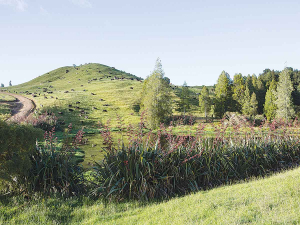State of the Dairy Nation 2024/25: DairyNZ Highlights Record Milk Production and Export Growth
DairyNZ's chief executive Campbell Parker says the 2024/25 dairy season reinforces the importance of the dairy sector to New Zealand.
 Funding will be available to support actions like installing mini wetlands, removing sediment, riparian planting, helping farmers with stock exclusion and developing farm plans.
Funding will be available to support actions like installing mini wetlands, removing sediment, riparian planting, helping farmers with stock exclusion and developing farm plans.
The Government has taken on board dairy sector feedback in its revised Essential Freshwater package but issues remain, says DairyNZ.
Over the last eight months the dairy lobby has advocated for an evidence-based and pragmatic approach to freshwater regulation.
DairyNZ chief executive Tim Mackle says it is pleased to see the Government has listened and made significant changes to some of the more controversial elements of their original proposal.
However, there’s still a sting in the tail, says Mackle.
“Like all New Zealanders, dairy farmers share ambitions for healthy waterways and have invested a lot of time and money for over a decade in improved management systems, upgrading effluent systems, riparian planting and fencing streams to exclude cattle.
“Looking at where the policy has landed, it appears that the Government have taken a better approach in terms of scientific rigour and practicality for farmers on the ground.”
The Government have parked the dissolved inorganic nitrogen (DIN) measure and removed the impractical and expensive requirement for farmers to move existing fences to meet new stock exclusion guidelines, two policies of great concern for farmers.
But DairyNZ is also concerned that the minister intends to revisit the DIN in 12 months.
Mackle says the proposed 95% protection standard will severely affect farmers in catchments who are already taking significant action towards reducing their footprint in line with new Regional Council policy plans.
For example, in Canterbury’s Selwyn and Hinds zones farmers are already working towards a 30% reduction in nitrogen. Under these new regulations, these reductions may need to increase to 70% to meet the standards being proposed.
“The Government and regional councils need to take a more nuanced approach when it comes to rolling out plans in regions where farmers are already undergoing significant change due to recent nutrient limits.”
To celebrate the tenth anniversary of its annual Good Deeds competition, Rabobank will give away $100,000 to improve rural community hubs, schools, clubrooms, and marae across New Zealand.
Agricultural and veterinary product supplier Shoof International has appointed Michaela Dumper as its new chief executive.
Federated Farmers is celebrating following the Government's announcement that young farmers will be able to use their KiwiSaver funds to buy their first home or farm.
The Meat Industry Association of New Zealand (MIA) today announced that Chief Executive Officer Sirma Karapeeva has resigned from the role.
The winners of the 2026 Hawke’s Bay/Wairarapa Dairy Industry Awards were announced at the annual awards dinner held at Copthorne Solway Park in Masterton on Thursday evening.
Environment Southland is welcoming this week’s decision by the Environmental Protection Authority (EPA) to approve the release of Blaptea elguetai, a leaf‑feeding beetle that will help control the highly invasive Chilean flame creeper.